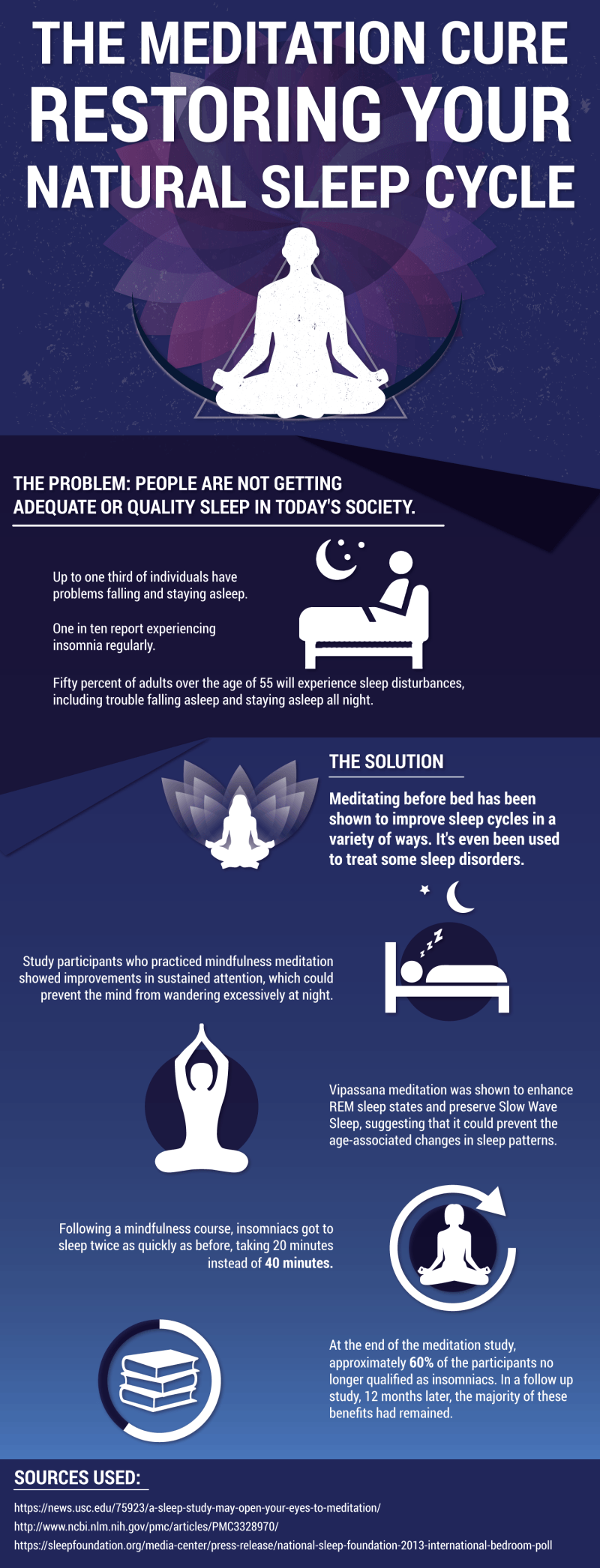No matter the time of day, the benefits of meditation vary from physical, to mental and emotional. From improved focus to lower stress levels, meditation has grown to become an incredibly popular health and wellness practice that can transform your life.
Sleep problems like insomnia are an epidemic, but they are rarely addressed to the extent they should be. As a society, we’ve become blind to the critical effects sleep has on our health and well-being. While we wouldn’t think of going a day without so-called essentials like coffee, going a night without sleep is not considered a big deal.
As we become desensitized to sleep deprivation, the lack of rest still impacts our bodies in subtle and not-so-subtle ways. From heart disease to obesity, significant amounts of over- or under-sleeping have clearly been linked to disease. Luckily, meditation is a key component to healing from disrupted sleep cycles.
A groundbreaking study by the University of Massachusetts Medical School revealed that 58% of insomniac participants showed significant improvements from meditation. An astounding 91% of those on medication were able to reduce the dosage or stop the drugs completely. After several months, more than half of the participants reported that they were maintaining a better sleep cycle, showing that meditation is a great long-term tool for combating insomnia.
How Meditation Improves Sleep
There are a few key ways meditation impacts sleep. The most obvious point we often hear about is how meditation soothes stress. But to be more precise, meditation soothes stress because it activates our autonomic nervous system, allowing for better sleep, stronger digestion, and deeper breathing.
Due to the development of today’s fast-paced culture, the human nervous system has begun to show signs of dysfunction, going into survival mode far more often than is healthy or necessary. Thus meditation is equivalent to a human “reset” button that puts us back into our natural physiological state.
Another factor research has shown is that meditating before bed preserves Slow Wave Sleep, or the deepest stage of non-REM sleep. This is a common problem area for those over fifty years old. So what can we do to boost the chances of a peaceful and uninterrupted sleep every night?
How Should You Meditate Before Bed?
Meditating before bed can look different for each individual, depending on your preferences. Some prefer guided meditations, where a narrator’s soft and soothing voice carries you through to physical relaxation and eventual sleep. Others prefer playing meditative music or binaural beats to relieve the mind and achieve deeper states of calm.
Luckily, you can eliminate the confusion of not knowing how to start by meditating online. There are countless free resources to experiment with, from ancient Buddhist techniques to modern variations.
One of the most grounding practices you can perform before bed is a guided Vipassana meditation. This style of meditation is especially useful for those with overactive minds, anxiety, or the general feeling of being ungrounded. The word Vipassana means to have insight into the true nature of things.
Beginners may feel as though it is the first time they can sense their physical bodies or notice the room they are in. In this sense, Vipassana silences the worry and mental clutter of the day, replacing it with the simple awareness of what is actually happening in the moment.
So how is it done? This technique will have you focus on one or two things at a time – such as your hand, the sound of your breath, or the blank view you see with closed eyes. Regardless of the focal point, these meditations calm the nervous system, allowing for the enhancement of REM sleep. This may be especially helpful to those who get a full night’s sleep, but still seem to wake up feeling fatigued each morning.
Before even getting started with a meditation habit, it’s wise to cultivate a general evening routine. This will prepare you for meditation so that you don’t have to abruptly make the switch from a chaotic and busy day to a quiet and relaxing night. Try adopting just a few habits every evening, such as turning your phone off, journaling, or making some hot tea as you wind down and transition to sleep. In just a few days, with practice, you may notice a huge shift in your ability to get calm and stay calm throughout the night.













































